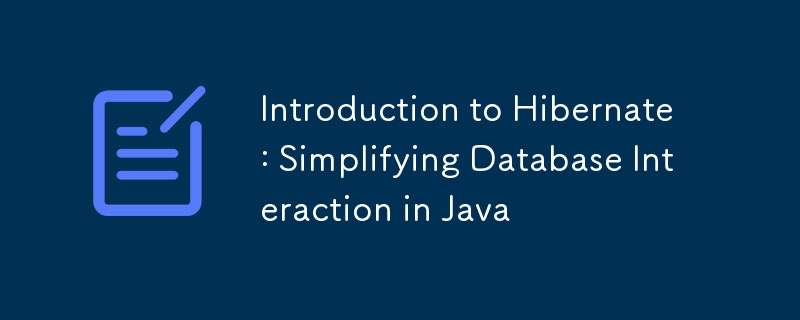Introduction to Hibernate : Simplifying Database Interaction in Java

Developers frequently manage data—storing, retrieving, updating, and deleting it. This often involves database interaction, typically using either NoSQL (like MongoDB) or SQL databases (MySQL, PostgreSQL, Oracle, etc.). Working with SQL databases necessitates writing queries for CRUD (Create, Read, Update, Delete) operations. However, manual SQL query creation can be cumbersome and repetitive, particularly in complex applications. This is where Object-Relational Mappers (ORMs) prove invaluable.
Feel free to contact me for freelance opportunities or collaborations. I welcome new projects and challenges!
Understanding ORMs
ORM, or Object-Relational Mapping, simplifies database interaction for developers. It bridges the gap between object-oriented programming languages (like Java) and relational databases. ORMs allow developers to use objects to interact with the database, eliminating the need for raw SQL queries. This results in cleaner, more maintainable, and understandable code.
Introducing Hibernate
Hibernate is a widely-used Java ORM framework. It streamlines Java database interaction by automating repetitive tasks such as SQL query generation, transaction management, and object-database table mapping.
Key Hibernate Features
Hibernate offers several powerful features:
- Object-Relational Mapping: Hibernate maps Java classes to database tables and Java objects to table rows, handling data persistence efficiently without explicit SQL.
- Database Portability: Hibernate's database-agnostic nature allows easy switching between databases with minimal reconfiguration.
- Automated Schema Management: Hibernate can automatically generate or update the database schema based on your Java object definitions.
- Caching Mechanisms: Hibernate employs caching (both session-based and shared across sessions) to enhance performance by reducing database calls.
Benefits of Using Hibernate
Hibernate offers significant advantages for Java developers:
- Reduced Boilerplate Code: Hibernate eliminates the need for repetitive JDBC code for standard CRUD operations.
- Improved Maintainability: Decoupling database and application logic improves code maintainability and refactoring ease.
- Enhanced Performance: Hibernate's caching significantly reduces database interactions, boosting application speed.
- Simplified Complex Operations: Hibernate simplifies complex database operations (joins and relationships) using built-in tools and HQL (Hibernate Query Language).
The above is the detailed content of Introduction to Hibernate : Simplifying Database Interaction in Java. For more information, please follow other related articles on the PHP Chinese website!

Hot AI Tools

Undresser.AI Undress
AI-powered app for creating realistic nude photos

AI Clothes Remover
Online AI tool for removing clothes from photos.

Undress AI Tool
Undress images for free

Clothoff.io
AI clothes remover

Video Face Swap
Swap faces in any video effortlessly with our completely free AI face swap tool!

Hot Article

Hot Tools

Notepad++7.3.1
Easy-to-use and free code editor

SublimeText3 Chinese version
Chinese version, very easy to use

Zend Studio 13.0.1
Powerful PHP integrated development environment

Dreamweaver CS6
Visual web development tools

SublimeText3 Mac version
God-level code editing software (SublimeText3)

Hot Topics
 Is the company's security software causing the application to fail to run? How to troubleshoot and solve it?
Apr 19, 2025 pm 04:51 PM
Is the company's security software causing the application to fail to run? How to troubleshoot and solve it?
Apr 19, 2025 pm 04:51 PM
Troubleshooting and solutions to the company's security software that causes some applications to not function properly. Many companies will deploy security software in order to ensure internal network security. ...
 How to simplify field mapping issues in system docking using MapStruct?
Apr 19, 2025 pm 06:21 PM
How to simplify field mapping issues in system docking using MapStruct?
Apr 19, 2025 pm 06:21 PM
Field mapping processing in system docking often encounters a difficult problem when performing system docking: how to effectively map the interface fields of system A...
 How to elegantly obtain entity class variable names to build database query conditions?
Apr 19, 2025 pm 11:42 PM
How to elegantly obtain entity class variable names to build database query conditions?
Apr 19, 2025 pm 11:42 PM
When using MyBatis-Plus or other ORM frameworks for database operations, it is often necessary to construct query conditions based on the attribute name of the entity class. If you manually every time...
 How do I convert names to numbers to implement sorting and maintain consistency in groups?
Apr 19, 2025 pm 11:30 PM
How do I convert names to numbers to implement sorting and maintain consistency in groups?
Apr 19, 2025 pm 11:30 PM
Solutions to convert names to numbers to implement sorting In many application scenarios, users may need to sort in groups, especially in one...
 How does IntelliJ IDEA identify the port number of a Spring Boot project without outputting a log?
Apr 19, 2025 pm 11:45 PM
How does IntelliJ IDEA identify the port number of a Spring Boot project without outputting a log?
Apr 19, 2025 pm 11:45 PM
Start Spring using IntelliJIDEAUltimate version...
 How to safely convert Java objects to arrays?
Apr 19, 2025 pm 11:33 PM
How to safely convert Java objects to arrays?
Apr 19, 2025 pm 11:33 PM
Conversion of Java Objects and Arrays: In-depth discussion of the risks and correct methods of cast type conversion Many Java beginners will encounter the conversion of an object into an array...
 E-commerce platform SKU and SPU database design: How to take into account both user-defined attributes and attributeless products?
Apr 19, 2025 pm 11:27 PM
E-commerce platform SKU and SPU database design: How to take into account both user-defined attributes and attributeless products?
Apr 19, 2025 pm 11:27 PM
Detailed explanation of the design of SKU and SPU tables on e-commerce platforms This article will discuss the database design issues of SKU and SPU in e-commerce platforms, especially how to deal with user-defined sales...
 How to elegantly get entity class variable name building query conditions when using TKMyBatis for database query?
Apr 19, 2025 pm 09:51 PM
How to elegantly get entity class variable name building query conditions when using TKMyBatis for database query?
Apr 19, 2025 pm 09:51 PM
When using TKMyBatis for database queries, how to gracefully get entity class variable names to build query conditions is a common problem. This article will pin...






